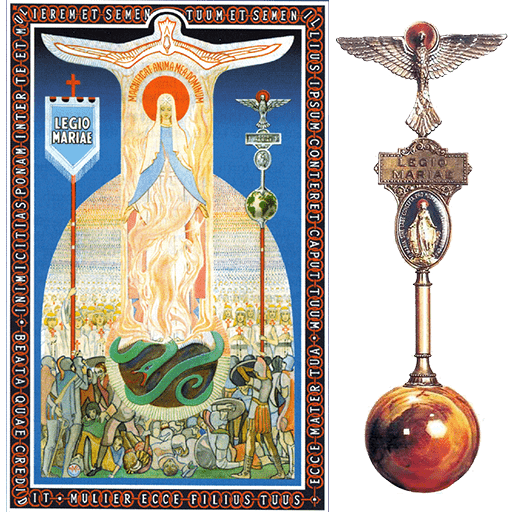The Legion and the Rosary Confraternity
Every month Concilium listens to reports from all over the world. They are always impressive and sometimes profoundly thought provoking and inspiring. One part of the Legion world can take hope and courage from another part of the Legion world. But sometimes it can happen that when you reflect on the innumerable apostolates undertaken by the Legion worldwide in the light of the Handbook, questions may arise. Recently I came to realise that I had never given an Allocutio on the Confraternity of the Holy Rosary since becoming Spiritual Director to Concilium, nor do I remember it being mentioned in many reports even though it figures to a significant degree in the Handbook. So let us think about it a little today.
In four separate places the Handbook recommends that legionaries should become members of the Rosary Confraternity. In chapter 33 on the basic duties of legionaries, the Handbook puts it very succinctly: ‘Every legionary, active and auxiliary, should enrol in the Confraternity of the Most Holy Rosary. The benefits attaching to membership are immense.’ Of course, our Founder Frank Duff enrolled as a member and countless other legionaries have done the same down through the years. Auxiliaries already do more than is required for membership and need only send in their applications to a centre of the Rosary Confraternity and duly receive a certificate of acceptance. In practice active legionaries are in the same position for although they are obliged only to the daily recitation of the Catena they are also recommended very strongly to recite all the Legion prayers and most legionaries in fact do so.
Put simply the Rosary Confraternity is: ‘an association that unites into one great family the faithful who undertake to recite the fifteen decades of the Rosary at least once a week.’ Now it is suggested that every member says the twenty decades that have been proposed by Pope John Paul II. The Handbook lists many of the spiritual benefits of membership of the Confraternity in its Appendix 7. They are worth quoting: ‘Some of the advantages of the Confraternity are as follows:- (a) The special protection of Our Lady, Queen of the Rosary; (b) a share in all the good works and spiritual benefits of the members of the Dominican Order and of the Rosary Confraternity, the world over; (c) a share, after death, in the prayers and suffrages offered by the same for the dead; (d) a plenary indulgence may be gained on the day of enrolment, on the feasts of Christmas, Easter, Annunciation (the Incarnation of the Lord), Assumption, Our Lady of the Rosary, Immaculate Conception, Presentation of Our Lord in the Temple. Apart from indulgences to be gained as members of the above Confraternity, a plenary indulgence is attached to five decades of the Rosary said while meditating upon the mysteries at the one time in a church or public oratory, or with a family, or in a religious community, or at a meeting of a pious association (which would include the Legion). A partial indulgence is attached to its recital in other circumstances. I think it is good to remember that we can gain a plenary indulgence every time we pray the Rosary together at our Legion meetings.
But why is the Legion so attached to the Rosary Confraternity? Well, I would suggest some of the reasons. Firstly, the Confraternity has always been seen as a way of radical consecration to Mary or more precisely to Jesus through Mary. This is what attracted St. Louis Marie de Montfort to it. It is said that he recruited over 100,000 persons to the Rosary Confraternity. It is also an essential part of his True Devotion to Mary. Once more the Handbook summarises the whole spirituality of the Confraternity: ’ Those who joint the Rosary Confraternity are invited to place in Our Lady’s hands not only their rosaries, but the value of all their works, sufferings and prayers, to be distributed as seems best to her among the other members and for the needs of the Church.’ The Rosary is a simple way of living the true devotion to Mary because it focuses us radically on Jesus in all his mysteries with the help of Mary, through her, in her and with her. It is her gift to the whole Church and in a special way to the Legion.
Secondly, the Rosary is a privileged way of evangelisation. Evangelisation is nothing more than giving Jesus to others. That is precisely the vocation of Mary. Her very identity is inextricably tied to bringing Jesus into the world and to each one of us. She pondered in her heart every word and action of Jesus her Son and she shares her interior life with us in the Rosary. It is therefore a magnificent method of evangelisation. So when legionaries distribute Rosaries and invite other to join the Rosary Confraternity it would be a good thing if they were fully conversant with the teaching of the Handbook on this topic. It would be an immensely profound and beautiful apostolate both for the legionary and the person they approach in friendship.
